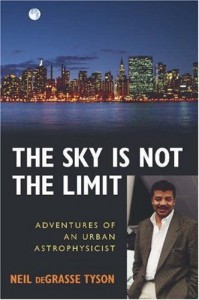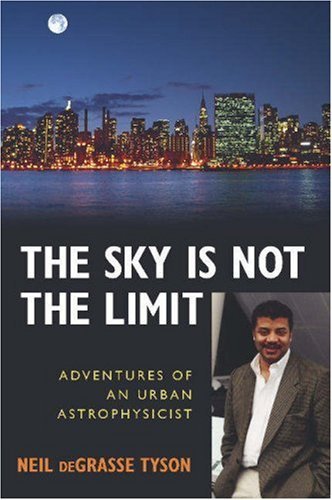
All I really knew about Neil deGrasse Tyson going into this book is from his appearances on The Daily Show, his hosting of NOVA ScienceNOW (seriously, what is up with that capitalization?), and perhaps short appearances in documentaries about science. So I guess I knew him as an interesting, fun guy who is big on all that science stuff.
The Sky is Not the Limit is pretty much a memoir. He talks about his love of astrophysics and how it grew from childhood onward.
At first this book read like a love letter to the Hayden Planetarium! Which before reading this book, I could not have accurately placed in New York City. It’s the Hayden Planetarium that inspired him to become an astrophysicist, and the Hayden Planetarium that really educated and pushed him that way (more so than school). And eventually the Hayden Planetarium that he became director of.
But eventually he does talk about other things. You wouldn’t think a black kid in the city would be particularly privileged, but he was very lucky. The Hayden Planetarium led him to a connection to this guy who was in um.. some sort of Explorer’s Club. I forget the name of it. And that led to opportunities to take trips and things. While still only 14, he was on an eclipse cruise with Isaac Asimov! Of course it helped that he decided on a career path early and avidly pursued it.
His story is interesting, although the book certainly has its less than stellar (wait for it…) moments.
Typographically: He misspelled Stephen Hawking’s first name once, though he got it right subsequently. Also there were a number of sentences that just.. made me stop and reread them. They weren’t constructed quite.. right. Or quite clearly. I guess it’s not necessarily something a copyeditor would notice, but it would’ve been nice if someone did.
Thematically: The last two chapters are about the end of the world and about god and science. They didn’t seem to quite belong in this book. Or, if they were going to be there, they should not have been the concluding chapters. I would’ve preferred a final chapter talking about his daily life now (what do astrophysicists do all day?), the Hayden Planetarium, or science education in the US.
Pictures: In the copy I read, there were pictures. Although we had our hands on another edition and that one did not. Oversight! Though I hate that pictures are usually in the middle of a book. It’s probably for pure physical publishing reasons, but.. it means that you’re already chapters away from a person’s childhood before you see a picture of them as a kid. And then if you look at all of the pictures when you come to them, you’re spoiled for the rest of the book! I’d prefer the pictures either spread out or entirely at the back.
When I started reading this book, I could strongly hear his voice narrating it for me. But soon enough that dropped away and it was just my usual inner reading voice. (Which sounds like me, but much cooler.)
He said a couple of things in this book that I disagree with. First, he seems to go on this rant against good students. Straight-A students will be Straight-A students regardless of their teacher. People with high IQs aren’t successful. They aren’t out saving the world. And though I can understand if he’s trying to tell kids who don’t get high marks that that doesn’t mean they can’t be successful after high school and do great, amazing, awesome things.. it felt kind of insulting to me. And could read as an excuse to slack off in school and go play with your telescope. Which will not get you into a good school with a scholarship!
Though I do agree that the terms ‘gifted and talented’ are problematic. I’ve read Talent is Overrated. I know that hard work and just sitting down and doing it will take you further than anything you inherited genetically.
It was a bit amusing to hear him rant about the starscape in the movie “Titanic”. Apparently it was wrong. And it was our scientific illiteracy as a nation that made this okay. He said more critics should be alert to these things. I think maybe he hasn’t been reading the geeky reviews I generally do. Believe me, if people notice a problem, they’ll say so! See Exhibit J and Exhibit K. (Those were even about astronomy!)
He devotes a chapter called “Dark Matters” to discussing a bit of what it’s like to be a black man and an astrophysicist. From the cops who pull him over more often than if he were white to the person at a wedding who assumed he knew more than Tyson did about how popcorn falls out of plane. (How cool is that, by the way? If I get married, prepare to see popcorn dropped from a plane!!) He also talks about the pressure he felt to succeed in athletics and how he got told at one point that he shouldn’t be studying something so frivolous as astrophysics. And how he eventually got past that idea to the idea that being seen on television and other places as a scientist and (later) television personality who just happens to be black was pretty darned important itself.
Taken all together, this book is an interesting look into how Neil deGrasse Tyson views the world. His passion for science in general and astronomy in particular really shines through. Especially when he’s trying to convince us that mathematical equations are easy, interesting, and fun! And you know what? He kind of makes me regret not growing up in a big city.
I’m thinking this book might be a good gateway into reading his more astronomy topic-specific books. Especially for people, including kids, who might be more inclined to like a biography than a science book.
Now go add NOVA ScienceNOW to your Tivo season passes.


We already have it set to record on ours!
I agree with you about the disjointedness of the second half (and mainly the last third) of the book. I can see why it would be difficult to work that stuff into a chronological narrative very easily, which is why he broke away from that after a while, but it ended up more like a collection of essays than the story that began at the front of the book.
I would also have loved to see more about what he actually does all day! I may have a better idea of that than you, having spent quite a bit of time hanging around the physics and astronomy departments in college, but it’s still hard for people to imagine. (My guess is he gets a lot of ‘Director of the Planetarium, huh? So you… describe what people are seeing there?’ just like librarians get ‘it must be nice to sit around and read all day’.)
Yea. I mean, I know astronomers look through telescopes and record what they see and compare it to what was seen previous and they look for weird things that weren’t there before. Yea? And I’m sure as a director, he does a lot of managerial things, and PR things. But I’m sure I’m leaving out a lot of things, because I just don’t know.